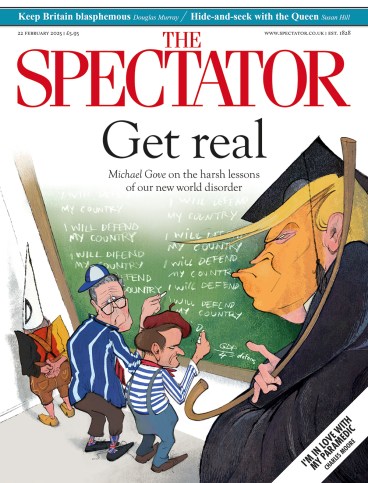
Unicorn, Mike Bartlett’s new play, involves some characters in chairs discussing a sexual threesome. That’s the entire show. Polly (Nicola Walker) is a drunken crosspatch who wants to spice up her loveless marriage to Dr Nick (Stephen Mangan) by bringing a blonde lesbian into the bedroom. Nick, a dithering twerp, doesn’t care if it happens or not and he lets his gobby wife talk him into it. She’s desperate for a bit of girl-on-girl action because she detests straight men (apart from Nick) and she dated women before she got married. It’s not clear why Nick puts up with this charmless windbag who treats him like a naughty spaniel and pouts angrily whenever he speaks.
Polly tracks down a gormless poetry student, Kate, and persuades her to join their triangular orgy. This is another puzzle. An attractive youngster like Kate has no reason to facilitate the sexual fantasies of two needy, bickering has-beens. Kate offers many explanations for her behaviour. Too many. She lost her parents early and she yearns for a family. She belongs to a new generation of sexual pioneers. She’s a randy hedonist who fears death and wants to seize pleasure while she can. The more reasons she gives, the clearer it becomes that her character makes no sense.
Nick’s romantic motives are another mystery. He and Polly are presented as equals in cupid’s marketplace but the visual evidence suggests otherwise. Surely Nick could pick up a svelte young medic from the hospital where he works. With his dreamy eyes and dark curly locks, he has the melancholy air of a violin maestro or a philosophising hermit. Polly, by contrast, looks like an Avon Lady who got sacked for drinking the nail varnish.
After many time-wasting postponements, the menage is finally consummated and the show ends on a happy note. Most of the delays are excuses for satirical speeches about orgasms, rough sex and kinky fetishes. Small boys would enjoy sniggering at this stuff. And the characters deliver tirades about gender fluidity, planetary meltdown and the vices of Caucasian males who enjoy beer and cycling. Feeble targets, stale attacks. Much of the script feels like comedy material that isn’t strong enough for the stand-up circuit.
You could listen to it like a podcast, in dribs and drabs, while you’re doing the ironing
Both Mangan and Walker carry themselves professionally and behave as if they’re committed to these tedious, threadbare characters. Erin Doherty, as Kate, overdoes the dim-witted cockney routine and honks out her lines like Arthur Mullard. At one point, Nick asks her how old she is. ‘Oim firty necks mumf,’ she rasps. The show is bound to prosper at the box office because it makes no demands on the audience. There’s virtually nothing to watch on stage and the dialogue has no subtext. The characters keep explaining at great length how they feel about each other and about the position they’re in. It would work perfectly well on radio. If the producers released an audio version you could listen to it like a podcast, in dribs and drabs, while you’re doing the ironing. That’s the level.
Charles Bukowski is a dead poet making a comeback. Born in Germany in 1920, Bukowski was raised in LA and he produced a large corpus of fiction and poetry that reflected his life as a cynical, hard-drinking drifter. Time magazine called him ‘the laureate of American low life’. He never achieved popular acclaim while he was alive but his work is starting to find new audiences. At the Riverside Studios, Art Theatre London presents a selection of poems and short stories dramatised for the stage.
The results are astonishing. This is authentic storytelling at its best. The material is weird, raw, nasty, hilarious, unpredictable. Just like real life. Bukowski could never have survived a creative writing course because he breaks all the rules. He doesn’t care which genre he’s using. He can’t decide who the main character is. And his endings are erratic and unsatisfying. He’s like a teenage genius who can’t be bothered finishing his homework.
Most of his characters are smart, articulate outcasts in surreal situations. An office worker returns home to find his flat being burgled by two nuns who pinch classical-music records. A character falls in love with a shop-window mannequin and tries to explain his new passion to his distraught girlfriend. Some of Bukowski’s poems are read out as well, but they seem a little contrived and pretentious. Twee, even.
The direction, by Anya Viller, feels deliberately clumsy. The sets are tatty and incomplete. The crude soundtrack barges in and makes the actors impossible to hear at times. The structure of the evening is shambolic. Poems and stories are thrown together randomly, as if by lucky dip. Who organised this show? No one. But the costumes look great. And the handsome young cast are a joy to watch. Despite its lack of polish, this is a thing of wonder.









Comments